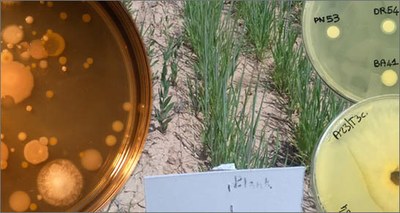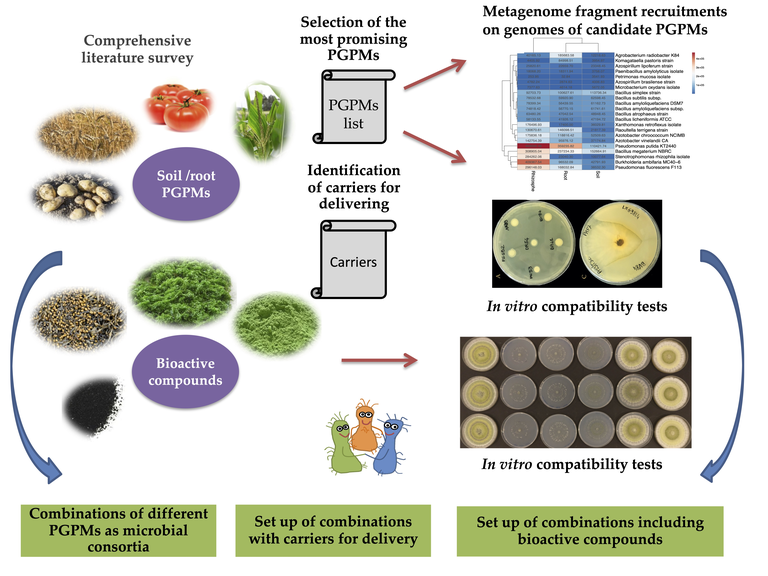Environment: from ENEA 'beneficial' microbes for agriculture
29/4/2021
Research projects to combat soil degradation
 Repairing the Earth’s ecosystems with the recruitment of 'beneficial' microbes improving yield and quality of crops but also capable of counteracting soil depletion, reclaiming contaminated land and reducing the use of water, fertilizers and pesticides. On the occasion of World Earth Day 2021, whose theme this year was "Restore Our Earth", ENEA presented the outcomes of three projects on the use of microbial communities for sustainable soil regeneration.
Repairing the Earth’s ecosystems with the recruitment of 'beneficial' microbes improving yield and quality of crops but also capable of counteracting soil depletion, reclaiming contaminated land and reducing the use of water, fertilizers and pesticides. On the occasion of World Earth Day 2021, whose theme this year was "Restore Our Earth", ENEA presented the outcomes of three projects on the use of microbial communities for sustainable soil regeneration.
To date, in fact, about 1/4 of the earth's surface has already become degraded and fertile soil is being lost at rate of 24bn tonnes a year, which has reduced the productivity of approximately 25% of the global land surface [1].
A very serious damage considering that soil is home to more than 25 percent of our planet's biodiversity and more than 40% of living organisms are associated during their life-cycle directly with soils [2].
The ENEA researchers have developed communities of beneficial microbes, almost 'cocktails' of bacteria and fungi, bringing together microorganisms promoting plant growth (the so-called Plant Growth Promoting Microorganisms, PGPMs) selected following a systematic literature review and their ability to coexist in vitro.
The outcomes of these activities, part of the project SIMBA [3] AND funded by the Horizon 2020 program, were published in the journal Microorganisms - MDPI]. The combination of microbial consortia with natural bioactive compounds (protein hydrolysates of plant origin, selected in the study) and the use of suitable soil improvers (identified in the project) will help increase soil fertility and improve yield and quality of crops.
"These multifunctional microbial consortia are a sustainable alternative to conventional pesticides and fertilizers since they can perform various functions, including nitrogen fixation and phosphorus solubilization in soils, promoting plant growth and improving soil’s resilience to stress ”, Annamaria Bevivino, Head of the ENEA Laboratory of Sustainability, Quality and Safety of Agri-food Systems, pointed out.
"Greenhouse and open-field experiments carried out also without water and with different fertilization levels, showed promising results on tomato, corn and wheat crops, with yields comparable to those obtained using commonly employed fertilizers" she said .
But there’s more. Microbial communities can help crops grow in the semi-arid and arid areas of the Mediterranean (Italy, Jordan, Cyprus, Greece and Algeria) as shown in the project EranetMed Supreme, coordinated by the University of Cagliari and conducted at the site of Al-Ghweir, Jordan.
In this case, the ENEA researchers used strains from the rhizosphere of local spontaneous plants and the experimentation – conducted on barley, the most grown crops in the area- showed that bacteria under water stress conditions can act as biofertilizers .
"This approach, which we have adopted also in the open-field experimentation currently underway, is based on local soil biodiversity and can be exploited both to improve traditional agricultural production, damaged by poor biogeochemical functions of soils and intensive use of fertilizers and water resources, and to promote innovative crops with high nutritional value ", Chiara Alisi of the ENEA Laboratory of Observations and Measurements for the Environment and Climate, said.
Finally, to 'Repair the Earth', plants and bacteria can be excellent allies for de-contaminating soils polluted by mining. This is the goal of some projects, including "Umbrella" and "SMERI", carried out in the mining site of Ingurtosu [4] (Sardinia), where ENEA researchers tested the effectiveness of soil remediation interventions through 'association of plants and microorganisms, the so-called assisted phyto-rehabilitation.
In order to avoid the dispersion of metals in the areas surrounding the mine and recover the functionality of soils, the ENEA researchers treated some land - used as mine waste deposits - by associating to the endemic plant "Euphorbia pithyusa L." a bacterial consortium of autochthonous strains, selected among the most resistant to heavy metals and promoters of plant growth.
"This type of experimentation, still underway, has proved to be effective both in improving microbial biodiversity and soil functions and in boosting spontaneous vegetation", Giada Migliore of the ENEA Laboratory of Observations and Measurements for the Environment and Climate, pointed out.
"This is why we hope for an ever greater use of the processes induced or produced by the associations between plants and microorganisms for remediation of soil contaminated by industrial activities, which cause drastic changes, altering its composition and self-remediation ability and adversely affect some of its key functions in the ecosystem".
The activities conducted by ENEA at the Al-Ghweir and Ingurtosu sites were presented at the FAO Global Symposium on Soil Biodiversity held in Rome.
ENEA, with its laboratories, infrastructures and long-standing experience and skills, participates in the national soil research center (Soil-HUB of the Italian Soil Partnership) and is actively engaged in the Global Soil Partnership and the European network of excellence on research on soil (European Joint Program, EJP-SOIL [5]), with the aim of preserving the ecosystem functions of soil and mitigating the impact of climate change on agricultural systems.

Experimental design summarizing the methodology used by the authors to set-up microbial consortia and methods of application https://www.mdpi.com/2076-2607/9/2/426
For more information on the European projects SIMBA, SoilHUB e EJP SOIL, please contact: annamaria.bevivino@enea.it - Head of the ENEA Laboratory for Sustainability,Quality and Safety of Agri-food Systems
Link to the publication: https://www.mdpi.com/2076-2607/9/2/426
For more information on the European project EranetMed Supreme in Al-Ghweir, please contact: chiara.alisi@enea.it - ENEA Laboratory of Observations and Measurements for the Environment and Climate
For more information on the European project UMBRELLA and POR Sardegna SMERI in the Ingurtosu mine, please contact: giada.migliore@enea.it - ENEA Laboratory of Observations and Measurements for the Environment and Climate
ENEA Channel – Improve productivity, quality and sustainability of food chains with microbes
ENEA Channel - L’importanza di chiamarsi microbo - ENEA per qualità e sicurezza alimentari
[1] https://www.ipbes.net/news/Media-Release-Global-Assessment IPBES (Intergovernmental Science-Policy Platform on Biodiversity and Ecosystem Services (IPBES)
[2] http://www.fao.org/news/story/it/item/1339045/icode/
[3] Sustainable Innovation of MicroBiome Applications in Food System- a project comprising ENEA and 22 other companies and research institutions, coordinated by the Finnish Natural Resources Institute (LUKE).
[4] The Ingurtosu Mine is one of the eight mining sites of the Geo-mining Historical and Environmental Park of Sardinia, declared by UNESCO in 1997 “the first park in the world network of Geoparks”, which was established to protect and enhance the technical-scientific, historical, cultural and environmental values of sites where man exploited and used geological and mineral resources.
[5] http://progettiue.enea.it/dettagli_prog.asp?id=1303; https://ejpsoil.eu
